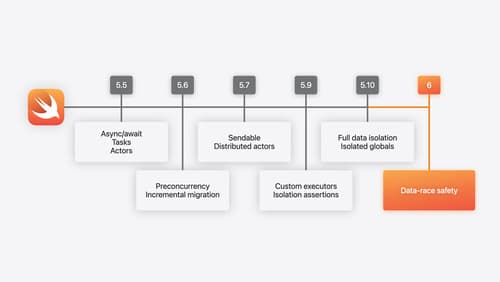mergable libraries
Asked on 2024-08-13
1 search
It seems like you're interested in mergable libraries, which can relate to how modules and packages are managed in Swift. At WWDC, there were several sessions that touched on related topics:
-
Demystify explicitly built modules: This session explains how modules in Swift and Objective-C are structured and how they interact with each other. It discusses the concept of module maps and how they help in managing module dependencies.
-
A Swift Tour: Explore Swift’s features and design: This session covers how Swift organizes code into modules and packages, and how these can depend on each other. It also explains the use of the Swift Package Manager for managing these packages.
-
Explore the Swift on Server ecosystem: This session highlights the use of various libraries in the Swift server ecosystem, including how to find and use them through resources like the Swift package index.
If you are looking for specific information on how to merge or manage libraries, you might find the session on "A Swift Tour: Explore Swift’s features and design" particularly useful, especially the chapter on Code organization.
If you have more specific questions or need further details, feel free to ask!

What’s new in Swift
Join us for an update on Swift. We’ll briefly go through a history of Swift over the past decade, and show you how the community has grown through workgroups, expanded the package ecosystem, and increased platform support. We’ll introduce you to a new language mode that achieves data-race safety by default, and a language subset that lets you run Swift on highly constrained systems. We’ll also explore some language updates including noncopyable types, typed throws, and improved C++ interoperability.

A Swift Tour: Explore Swift’s features and design
Learn the essential features and design philosophy of the Swift programming language. We’ll explore how to model data, handle errors, use protocols, write concurrent code, and more while building up a Swift package that has a library, an HTTP server, and a command line client. Whether you’re just beginning your Swift journey or have been with us from the start, this talk will help you get the most out of the language.

Explore the Swift on Server ecosystem
Swift is a great language for writing your server applications, and powers critical services across Apple’s cloud products. We’ll explore tooling, delve into the Swift server package ecosystem, and demonstrate how to interact with databases and add observability to applications.
